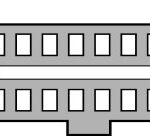Experiencing sluggish acceleration and a blinking overdrive light in your Ford? You might be dealing with the dreaded P0743 OBD2 code. This code indicates a problem with the torque converter clutch (TCC) circuit, a crucial component for smooth shifting and fuel efficiency. While the original post discusses a 2002 Ford Excursion with similar issues and codes P1744 and P1743, this article specifically focuses on the P0743 code in 2003 Ford vehicles. Let’s explore the causes, symptoms, and solutions for this common transmission trouble code.
Understanding the P0743 Code
The P0743 diagnostic trouble code (DTC) signifies an electrical malfunction in the torque converter clutch circuit. The TCC, when engaged, locks the engine and transmission together, improving fuel economy and reducing transmission heat. A fault in this circuit prevents the TCC from engaging or disengaging properly, leading to performance issues.
Common Symptoms of a P0743 Code
A faulty TCC circuit often manifests in various driving symptoms. Some common indicators of a P0743 code in a 2003 Ford include:
- Illuminated Check Engine Light: The most obvious symptom is the activation of the check engine light on your dashboard.
- Overdrive Light Flashing: A flashing overdrive (OD) off light can indicate transmission problems, including issues with the TCC.
- Poor Fuel Economy: Since the TCC isn’t locking up efficiently, your engine might work harder, resulting in decreased fuel mileage.
- Sluggish Acceleration: Difficulty accelerating, especially at highway speeds, can be attributed to a malfunctioning TCC.
- Increased Engine RPM: You might notice higher than usual engine RPM at cruising speeds, as the TCC isn’t locking the engine and transmission together.
- Overheating Transmission: Continuous slipping of the TCC can generate excessive heat, potentially damaging the transmission.
Causes of a P0743 Code in a Ford
Several factors can contribute to a P0743 code in a 2003 Ford. These include:
- Faulty TCC Solenoid: The TCC solenoid controls fluid flow to engage and disengage the TCC. A malfunctioning solenoid is a common culprit.
- Wiring Issues: Damaged or corroded wiring within the TCC circuit can disrupt the electrical signals, triggering the P0743 code.
- Low Transmission Fluid: Insufficient transmission fluid levels can prevent proper TCC operation and lead to various problems, including the P0743 code.
- Dirty Transmission Fluid: Contaminated transmission fluid can hinder the solenoid’s performance and affect the TCC’s engagement.
- Transmission Control Module (TCM) Problems: In rare cases, a malfunctioning TCM might be responsible for the P0743 code.
Diagnosing and Fixing a P0743 Code
Diagnosing a P0743 code requires a systematic approach:
-
Retrieve Diagnostic Trouble Codes: Use an OBD2 scanner to read the codes stored in the vehicle’s computer.
-
Check Transmission Fluid: Inspect the transmission fluid level and condition. Low or dirty fluid needs to be addressed.
-
Inspect Wiring and Connectors: Visually examine the wiring harness and connectors associated with the TCC solenoid for any damage or corrosion.
-
Test the TCC Solenoid: Use a multimeter to check the solenoid’s resistance and ensure it’s within the specified range.
-
Consult a Professional: If the problem persists after checking these components, consult a qualified mechanic for further diagnosis and repair. They might need to perform more advanced tests, such as checking the TCM or internal transmission components. This might involve replacing the TCC solenoid, repairing wiring, or even rebuilding the transmission in severe cases.
Conclusion
The P0743 OBD2 code in a 2003 Ford indicates a problem with the torque converter clutch circuit, potentially leading to reduced performance and fuel efficiency. While some fixes might be straightforward, like changing the transmission fluid, others may require professional assistance. By understanding the causes, symptoms, and diagnostic steps, you can take proactive measures to address this issue and ensure your Ford runs smoothly.
